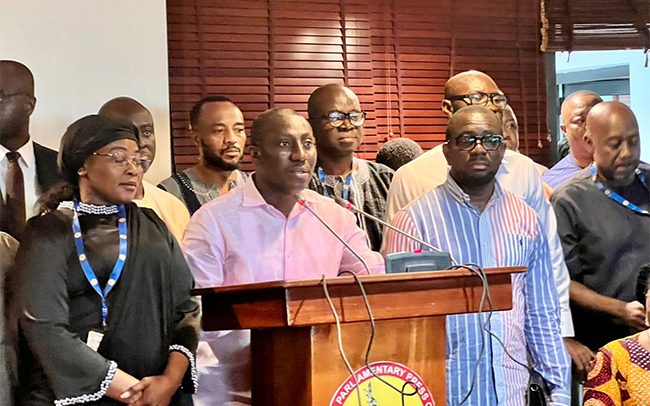Mr. Afenyo-Markin speaking during the press briefing
The Minority Leader in Parliament, Alexander Afenyo-Markin has stated that the Speaker overstepped his legal authority in a recent incident where he suspended Members of Parliament (MPs) without due process.
In a press briefing, the Minority Leader argued that the Speaker grossly exceeded his jurisdiction last Friday by his ultra vires action, which undermined parliamentary procedure and infringed on the rights of the affected MPs.
“We’ve listened carefully to the Speaker’s statements, and we have come to a conclusion that Mr. Speaker has acted beyond his legal mandate,” the Minority Leader asserted.
He added, “He arrogated powers that he does not have, violating established parliamentary rules in the process.”
The controversy stems from the suspension of four MPs following a disorderly conduct incident during a session of the Appointments Committee last Thursday.
Mr. Afenyo-Markin emphasised that such matters fall within the committee’s jurisdiction and that the Speaker should not have intervened.
In this case, according to the Minority Leader, the Appointments Committee Chairman, Bernard Ahiafor, had the authority to address the situation but instead Speaker Alban S. K. Bagbin acted alone, suspending members without offering them the chance to be heard.
The Minority Leader pointed out that Mr. Bagbin did not consult the leadership of the committee or communicate with them about the actions taken.
“The committee chair did not inform the Speaker of the suspension. There was no dialogue, no formal hearing, and no effort to follow due process,” Mr. Afenyo-Markin asserted.
He further pointed out that any punishment for contempt in Parliament must follow a prescribed process, including committee deliberation and a formal motion, which the Speaker failed to observe.
The Minority Leader noted the Speaker’s recent communications surrounding this issue were vague and lacked legal clarity.
“We don’t know whether to treat the Speaker’s statement as a ruling or just a communication,” he said.
“The rules are clear on what constitutes a ruling, and if it is indeed a ruling, there are procedures to challenge it. But the Speaker’s approach has left us in limbo,” he added.
In a broader critique, the Minority Leader also highlighted what he described as the NDC majority’s disregard for the Speaker’s authority.
He mentioned that, on one occasion, the majority disregarded a directive from the Speaker, further deepening the tensions within Parliament.
Despite the ongoing issues, the Minority Leader reiterated their commitment to maintaining a cooperative stance with the majority for the national interest.
However, he emphasised that they would not tolerate intimidation tactics.
“We will never surrender to any intimidation, and we will continue to fight for the fairness and transparency that Parliament demands. We remain committed to constructive engagement, but the NDC majority must understand that they cannot bulldoze their way through Parliament,” he said.
The Minority Leader also discussed frustrations within the Appointments Committee, particularly regarding the conduct of the clerk, Gifty Jiagge-Gobah.
He accused Mrs. Jiagge-Gobah of being partisan and failing to perform her duties professionally.
“She has caused us significant discomfort. We have tried to work with her, but she has not upheld the standards expected of her position,” he remarked.
Turning to the larger vetting process, the Minority Leader expressed concern over the increasing aggression in the NDC’s approach, calling some members of the ruling party “bullies.”
He argued that such behaviour undermines the democratic principles of the parliamentary process and that the minority would stand firm in its position, even if it means protesting to make their voices heard.
“We have been the most cooperative in Parliament. Despite all the issues, we have supported the government in its appointments. But we are not going to tolerate a system where decisions are made without consultation or fairness,” he stated.
The Minority Leader also referenced past parliamentary practices, citing instances where the Minority, under leadership Haruna Iddrisu and the Speaker himself, had engaged in rigorous vetting processes, scrutinizing nominees at length.
He drew comparisons to the current situation, accusing the majority of being intolerant of opposition scrutiny and questioning whether the current level of oversight was adequate.
“We must remember, this is not the first time the Minority has had to oppose unfair practices. We have been in these situations before, and we will continue to challenge injustices when we see them,” he asserted.
The Minority Leader said they had escalated the matter to the national party leadership, urging that steps be taken to ensure a fair and transparent process within Parliament.
He emphasised that they are committed to seeing that justice is served for the suspended members and that such actions do not become a recurring issue.
“We will continue to fight for the rights of our colleagues and the integrity of our parliamentary processes. We will not be intimidated, and we will ensure that the right thing is done—for the national interest,” he concluded.
By Ernest Kofi Adu Adu, Parliament House


